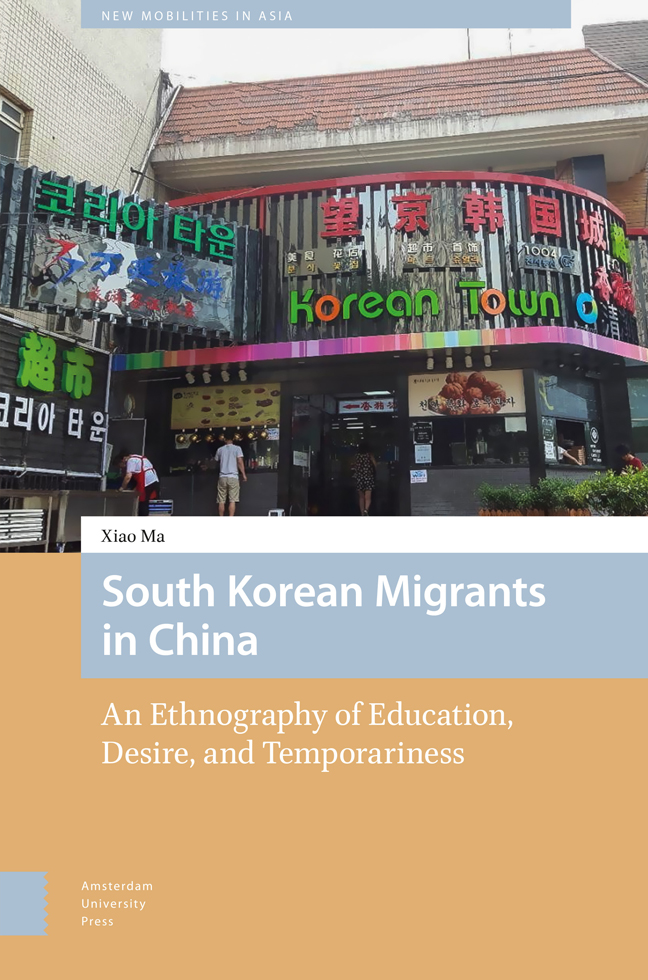Book contents
- Frontmatter
- Contents
- List of Illustrations
- Acknowledgements
- 1 Introduction
- 2 Temporary Residents’ Community in Beijing
- 3 The Internationalised Education of China and the Globalised Education of South Korea
- 4 Educational Desire in School Choice: Identities of Home, Destination and the World
- 5 Desirable Homecoming: The Pursuit of Tertiary Education in the Context of Temporary Migration Regimes
- 6 Internationalisation in Chinese Education: The Quest for Entry to a Top Chinese University
- 7 Conclusion
- Index
5 - Desirable Homecoming: The Pursuit of Tertiary Education in the Context of Temporary Migration Regimes
Published online by Cambridge University Press: 26 March 2024
- Frontmatter
- Contents
- List of Illustrations
- Acknowledgements
- 1 Introduction
- 2 Temporary Residents’ Community in Beijing
- 3 The Internationalised Education of China and the Globalised Education of South Korea
- 4 Educational Desire in School Choice: Identities of Home, Destination and the World
- 5 Desirable Homecoming: The Pursuit of Tertiary Education in the Context of Temporary Migration Regimes
- 6 Internationalisation in Chinese Education: The Quest for Entry to a Top Chinese University
- 7 Conclusion
- Index
Summary
Abstract
This chapter examines the motivations of Korean migrant parents and students as they look to return home to pursue a university degree at a top-ranked university. The chapter also deals with their preparations to return, focusing on the important role played by Korean schools and afterschool academies. Instead of being emotionally nostalgic, the desirable homecoming is a politically driven process that is shaped by the temporary migration regimes of the host and home country. Migrant families, as agentive subjects, carefully plan their stay in China and eventual return in order to sidestep the regulatory constraints that impact their children’s access to university opportunities. Through careful planning and extending their stay in China or a third country, Korean families perpetuate and benefit from a state of ‘temporariness’. The Korean-run schools and after-school academies discussed in this chapter can be seen as a form of ‘migration infrastructure’ that facilitates young Koreans in their homecoming.
Keywords: Homecoming, temporary migration regime, intermediaries
Return Migration in the Asian Context
Studies have shown that return migration in the Asian context is closely associated with the policies and rhetoric of nation states (Xiang 2013b; Baas 2015). For example, Xiang (2013b) highlights that return migration in Asia was ‘encouraged, facilitated and often enforced’ by states. This reflects ‘an overarching mode of governance’ that looks to ‘regulate mobility not by blocking but by facilitating movements’ (Xiang 2013b, 2–3). This governance also occurs in an environment partially characterised by the prevalence of a ‘temporary migration regime’ in Asia. This temporary migration regime – based on time-limited visas and short work contracts with few (if any) legal pathways towards permanent residence – has become a fundamental governing principle enforcing and perpetuating labour migrants’ continuous transnational mobility across national borders (Yeoh 2022). The temporary migration regime is also indicative of the regulatory constraints on foreigners’ permanent settlement and employment rights in China. This, coupled with Korea’s strong cultural values and preferential university admissions policies to attract overseas nationals back home, provides an explanation for return migration in my case study.
In Diasporic Homecomings, Tsuda (2009) attributes the motives of various diasporic populations returning to their ethnic homelands to two interconnected reasons: economic and ethnic.
- Type
- Chapter
- Information
- South Korean Migrants in ChinaAn Ethnography of Education, Desire, and Temporariness, pp. 125 - 150Publisher: Amsterdam University PressPrint publication year: 2024



